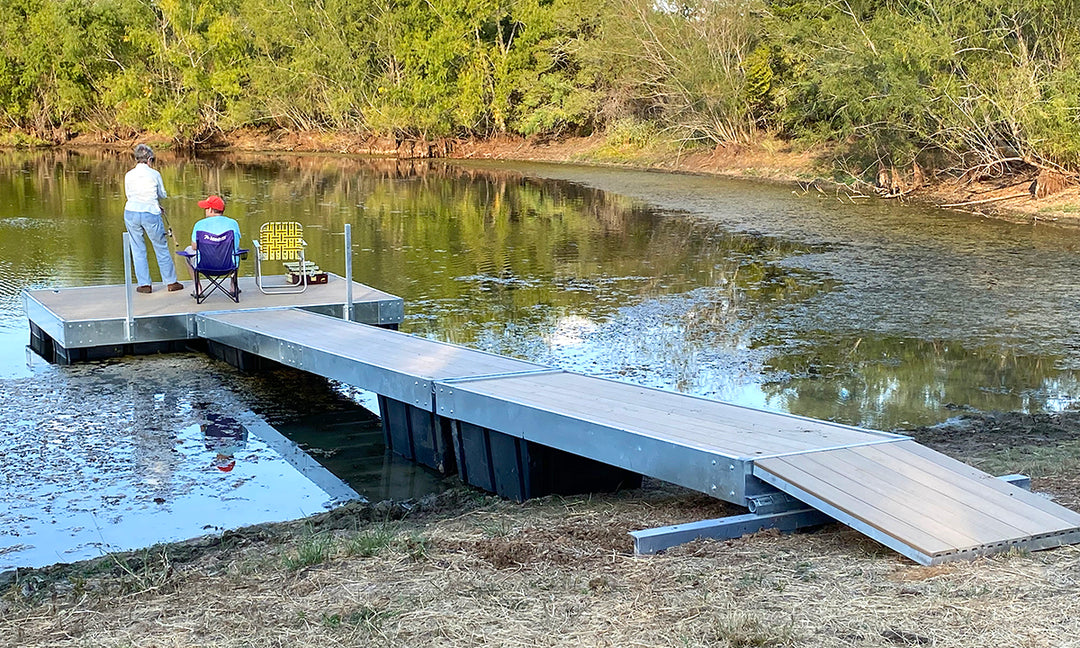Innovative Floating Docks: The Future of Waterside Access and Leisure
Innovative Floating Docks: The Future of Waterside Access and Leisure
Blog Article
Floating Docks: The Ideal Option for Versatile Water Access
Floating docks existing an engaging service for a range of water accessibility requires, providing adaptability that goes beyond conventional mooring options. Their capability to adjust to ever-changing water levels while making sure stability and safety and security makes them specifically useful for both leisure and industrial applications. In addition, the modular nature of floating docks assists in customization, accommodating particular needs. Nonetheless, the nuances of setup and maintenance, along with the series of applications, call for a closer examination to completely appreciate their potential advantages and effects for river gain access to approaches.
Benefits of Floating Docks
Floating docks deal countless advantages that enhance water gain access to for different applications. Their capability to climb and fall with changing water degrees makes them specifically useful in settings with changing tides or seasonal variations. This versatility makes sure that vessels can easily tie without worry for the water's deepness, giving a reliable platform for recreational, commercial, and commercial usages.
In addition, floating docks are frequently created from resilient products that stand up to rust, making them appropriate for long-term use in aquatic atmospheres. Their installation is generally much less intrusive than conventional fixed docks, minimizing the environmental impact and assisting in quicker release (floating docks). This flexibility permits less complicated relocation or reconfiguration according to customer requirements or environmental changes
Safety is one more vital advantage; floating docks can provide steady accessibility for individuals boarding or disembarking from watercrafts and reduce the danger of mishaps associated with unsteady surface areas. Moreover, they can be made to fit a variety of devices, such as fenders and cleats, enhancing capability. Generally, floating docks represent a reliable service for enhancing water accessibility across varied fields while advertising safety and environmental sustainability.

Kinds of Floating Docks
Numerous kinds of floating docks deal with various requirements and atmospheres, each designed with specific attributes to optimize capability. One of the most common kinds include modular docks, which consist of interlocking areas that permit for very easy personalization and development. These docks are optimal for entertainment use, as they can be tailored to fit different boat sizes and water conditions.
Another popular alternative is the stationary floating dock, which remains anchored in area however floats with transforming water degrees. floating dock builder. This type is particularly suited for areas with marginal tidal changes, giving steady access for angling or swimming. Additionally, there are drive-on docks, which feature a sloped style that permits watercrafts to conveniently drive on and off, making them ideal for individual boat and smaller vessels
For commercial applications, heavy-duty floating docks are available, constructed from strengthened products to withstand significant loads and rough marine environments. Environment-friendly floating docks make use of sustainable materials and styles to minimize ecological effect, usually incorporating features like greenery to support regional wild animals. Comprehending the different sorts of floating docks ensures that customers can choose the most proper solution for their details needs.
Installment Process Review
A successful setup of floating docks needs mindful preparation and attention to information to make certain optimal efficiency and safety and security. The initial action involves examining the site problems, including water deepness, current, and possible challenges. This analysis notifies the selection of the ideal dock products and design customized to the particular environment.
Next, getting needed licenses is essential, as several territories have laws pertaining to building and construction on water read the article bodies. The installment can continue when approvals are secured. Begin by preparing the foundation, which may involve anchoring systems or pilings tailored to the dock type and local problems.
Adhering to the foundation configuration, construct the dock sections according to maker specs. Ensure that all elements are firmly secured and aligned to withstand ecological stress and anxieties. Placement the dock in the marked location, ensuring it is level and steady.

Upkeep Tips and Ideal Practices
After the installment process is complete, ongoing maintenance plays an essential function in guaranteeing the longevity and functionality of go to this website floating docks. Regular assessments ought to be performed to determine any kind of indicators of damage, wear, or degeneration - floating dock builder. Check for any type of loose installations, cracks, or splitting up in the dock areas, as these can compromise architectural honesty
Cleaning up the dock is important to eliminate particles, algae, and other build-up that can impact its look and safety and security. Make use of a gentle stress laundry occasionally to maintain tidiness without creating damages to the surface area. In addition, applying a safety sealant every couple of years can help enhance durability and resist environmental wear.
Pay interest to the mooring lines and supports, ensuring they are totally free and protected from deterioration. Change any type of degraded parts quickly to avoid threats. Seasonal adjustments may likewise be essential; throughout severe weather, enhancing the dock or repositioning can prevent damages.
Applications for Floating Docks
Floating docks serve a wide range of applications, dealing with both commercial and entertainment requirements. In recreational settings, they provide smooth access to rivers for activities such as boating, fishing, and swimming. Their flexible nature permits installment in differing water degrees, guaranteeing steady and secure accessibility no matter tidal changes.
Commercially, floating docks are indispensable for marinas and waterside businesses. They facilitate the docking of vessels, allowing reliable filling and unloading of items. Their modular layout enables for very easy development or reconfiguration to suit changing company demands, making them ideal for boat leasings, excursion operations, or fishing charters.
Additionally, floating docks are made use of in environmental applications such as water research study and habitat repair. They can serve as systems for clinical studies, checking water high quality, or carrying out wildlife studies without Full Report troubling sensitive ecosystems.
In industrial contexts, floating docks are used in construction tasks, supplying access to hard-to-reach locations for equipment and personnel. Their versatility, durability, and very little effect on the setting make them an optimal choice for a wide variety of applications, enhancing both performance and availability in different water-based settings.
Final Thought
Finally, floating docks stand for an ideal remedy for varied water access requires, owing to their adaptability, sturdiness, and modular design. These structures help with safe mooring for numerous applications while reducing ecological influence throughout installation. The lowered upkeep needs better enhance their usefulness. Because of this, floating docks work as a beneficial property for recreational, business, and ecological jobs, guaranteeing reputable accessibility to rivers and promoting lasting methods in aquatic atmospheres.
Floating docks existing a compelling remedy for a selection of water gain access to needs, supplying versatility that goes beyond conventional mooring choices.Floating docks offer numerous advantages that boost water access for various applications. Overall, floating docks stand for an effective service for improving water accessibility across varied markets while promoting safety and security and environmental sustainability.
One more prominent option is the fixed floating dock, which continues to be secured in location however floats with changing water levels.In verdict, floating docks stand for an optimum remedy for diverse water access needs, owing to their versatility, longevity, and modular style.
Report this page